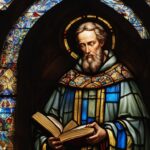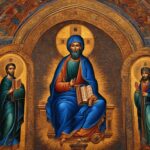St. Willibrord, the Patron Saint of Hope and Unity, is an inspiring figure whose remarkable achievements and unwavering faith continue to resonate with believers around the world. Born in Northumbria, England in 658, St. Willibrord’s early life and upbringing laid the foundation for his future call to religious life.
Inspired by his faith and the teachings of St. Egbert, St. Willibrord felt a deep calling to convert pagan tribes in Europe. At the request of Pepin of Herstal, he embarked on a mission to bring the Gospel to these tribes and spread the message of hope and unity.
Throughout his work, St. Willibrord established churches, monasteries, and educational institutions in regions such as Frisia, the Netherlands, and Luxembourg, contributing significantly to the growth of Christianity in these areas. His tireless dedication to spreading the teachings of Christ exemplified his spiritual life and philosophy, rooted in love and reconciliation.
Despite facing challenges and criticisms from pagan tribes, St. Willibrord remained steadfast in his faith and continued to carry out his mission with unwavering determination. His contributions were widely recognized, earning him the support and patronage of influential figures like Pepin of Herstal and Pope Sergius I. In 695, he was consecrated as the bishop of the Frisians by Pope Sergius I, solidifying his role as a spiritual leader.
St. Willibrord’s life was marked by numerous miracles and divine interventions, with his relics believed to possess healing powers. Following his death in 739, he was quickly recognized as a saint due to his exemplary life and the miracles associated with his intercession.
The legacy of St. Willibrord continues to have a profound impact on the Christian faith. His teachings of hope, unity, and love remain relevant in today’s world, inspiring believers to live out their faith and embrace these values. Countless individuals have shared personal reflections and testimonies about how St. Willibrord has influenced their faith journey.
- St. Willibrord was born in Northumbria, England in 658.
- He felt a calling to convert pagan tribes in Europe, spreading the message of hope and unity.
- St. Willibrord established churches, monasteries, and educational institutions.
- His spiritual life was rooted in love and reconciliation.
- St. Willibrord faced challenges and criticisms but remained steadfast in his mission.
Celebrated as the Patron Saint of Hope and Unity, St. Willibrord’s life and work continue to inspire believers worldwide. His dedication to the Gospel, recognition as a saint, and ongoing influence serve as a testament to his lasting significance.
Early Life and Background
St. Willibrord, the Patron Saint of Hope and Unity, was born in Northumbria, England in 658. Raised in a deeply religious family, he showed a strong inclination towards spirituality from a young age. His upbringing laid the foundation for his future call to religious life.
Inspired by his faith and the teachings of St. Egbert, St. Willibrord felt a calling to convert pagan tribes in Europe. At the request of Pepin of Herstal, he embarked on a mission to bring the Gospel to these tribes, spreading the message of hope and unity.
St. Willibrord’s remarkable achievements and unwavering faith continue to inspire generations.
Call to Religious Life
St. Willibrord, driven by his deep faith and the teachings of St. Egbert, embraced a powerful calling to bring the Gospel to pagan tribes in Europe. Moved by his desire to spread a message of hope and unity, he embarked on a mission at the request of Pepin of Herstal.
St. Willibrord recognized the spiritual void among these tribes and felt compelled to share the transformative power of Christ’s love. With unwavering dedication, he ventured into unfamiliar territories, determined to plant the seeds of Christianity and guide souls towards salvation.
“My duty is clear: to bring light to the darkness, to offer hope to the hopeless. I am called to be a vessel of God’s love, to pave the way for unity and peace in these lands.”
His courageous decision to heed the call and devote his life to God’s work ignited a spark of faith in countless hearts. St. Willibrord’s selfless commitment to his mission is an inspiration to all who yearn to make a meaningful impact in the world.
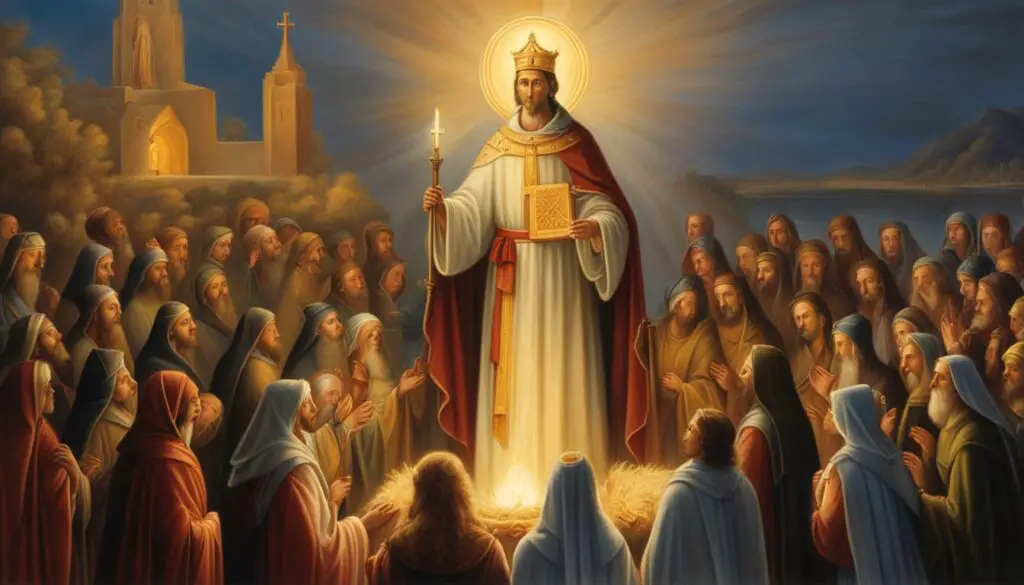
Work
St. Willibrord dedicated his life to spreading the teachings of Christ, leaving an indelible mark on the regions of Frisia, the Netherlands, Luxembourg, and beyond. His tireless efforts and unwavering faith laid the foundation for the growth of Christianity in these areas.
Throughout his mission, St. Willibrord established numerous churches, monasteries, and educational institutions, providing spiritual guidance and education to the local communities. His commitment to building these institutions fostered a sense of unity, hope, and faith among the people.
“The work of St. Willibrord in establishing churches and monasteries was truly inspiring. He dedicated his life to sharing the message of Christ, transforming communities and bringing hope to those in need.”
St. Willibrord’s contributions extended beyond religious institutions. He was also involved in societal and cultural development, championing education and literacy. Through his efforts, he helped shape the intellectual and spiritual landscape of the regions he served.
St. Willibrord’s influence and achievements can be seen in the vibrant Christian communities that exist today, as well as the countless lives he touched with his teachings, compassion, and dedication to service.
The Timeline of St. Willibrord’s Work
| Year | Event |
|---|---|
| 690 | Ordained as a priest |
| 695 | Consecrated as the bishop of the Frisians by Pope Sergius I |
| 698 | Established a monastery in Utrecht |
| 714 | Founding of the Abbey of Echternach |
| 739 | Death of St. Willibrord |
St. Willibrord’s work continues to inspire believers worldwide, serving as a reminder of the impact one person can have in spreading love, unity, and hope.
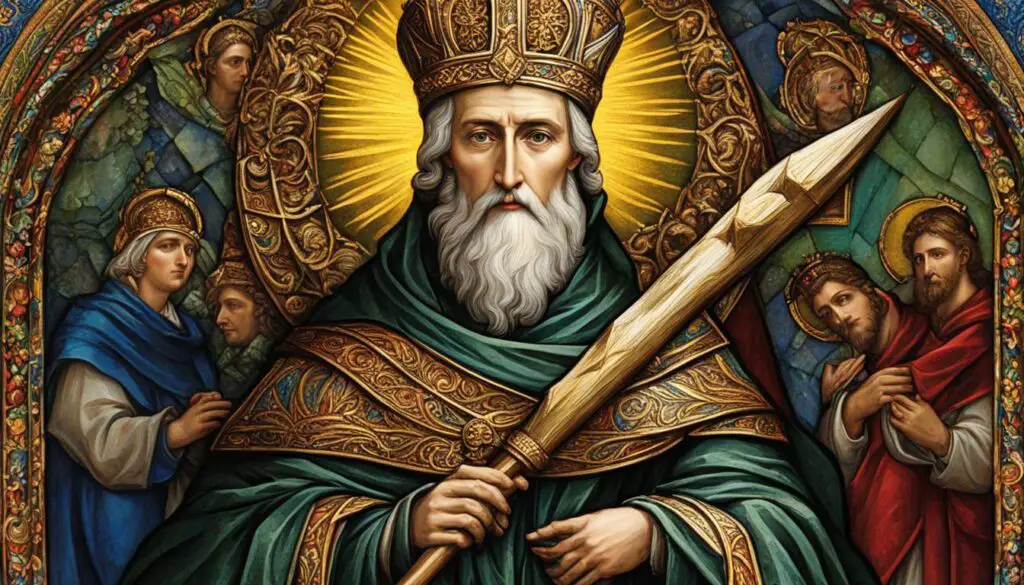
Spiritual Life and Philosophy
St. Willibrord’s spiritual life was characterized by deep devotion to God and a commitment to living out the teachings of Christ. He believed in the power of unity and peace, and he strived to foster these values within the communities he served. His philosophy of love and reconciliation continues to resonate with believers today.
“In his pursuit of religious life, St. Willibrord understood that true unity could only be achieved through love and understanding. He saw the importance of embracing diversity and bridging divides to create a stronger and more harmonious society.”
St. Willibrord’s spirituality was rooted in his unwavering faith in God’s presence and guidance. He sought to bring hope and healing to those he encountered, spreading the message of Christ’s love and salvation.
His commitment to unity was evident in his interactions with people from various backgrounds and cultures. St. Willibrord believed that by embracing differences and working together, individuals can overcome division and strife to create a better world.
Through his teachings and actions, St. Willibrord emphasized the importance of forgiveness, compassion, and reconciliation. He encouraged believers to live out their faith by showing kindness and understanding to others, fostering a spirit of unity and harmony.
St. Willibrord’s spiritual legacy continues to inspire individuals to embrace these teachings and strive for unity, peace, and love in their own lives. His example serves as a reminder that true spirituality is not confined to rituals and traditions, but rather a way of life that seeks to transform relationships and society for the better.
Key Points:
- St. Willibrord prioritized unity and peace in his spiritual philosophy.
- He believed in embracing diversity and bridging divides to create a stronger society.
- St. Willibrord’s spirituality was rooted in unwavering faith and a commitment to spreading Christ’s message of love and salvation.
- His teachings emphasized forgiveness, compassion, and reconciliation.
- St. Willibrord’s legacy inspires individuals to strive for unity, peace, and love in their own lives.
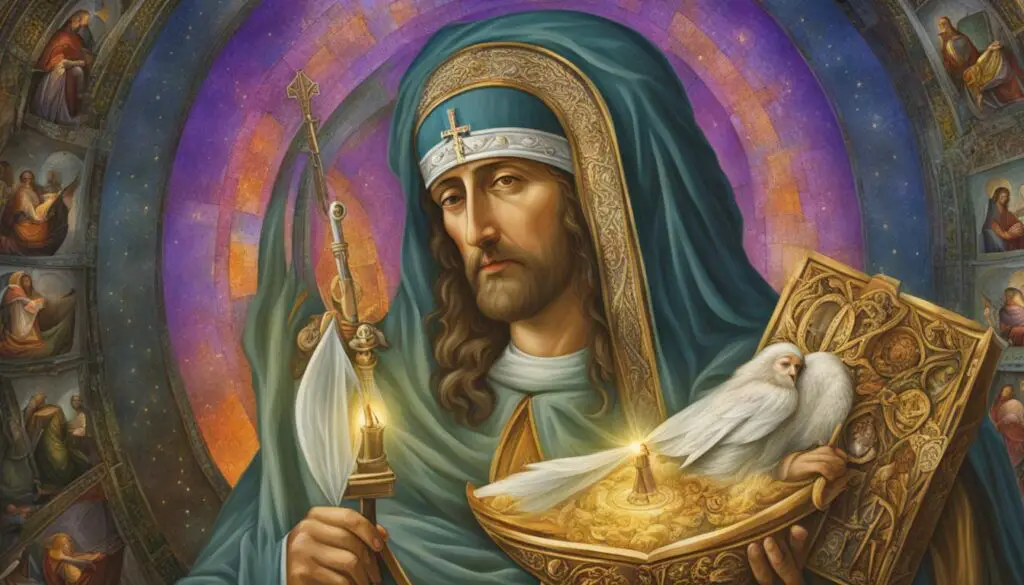
Challenges and Criticisms
St. Willibrord’s missionary work was not without its challenges and criticisms. He faced significant resistance from pagan tribes who were resistant to converting to Christianity. Despite his persistent efforts, he encountered setbacks and obstacles along the way.
One of the greatest challenges St. Willibrord faced was the destruction of churches. Pagan tribes, threatened by the spread of Christianity, often targeted and vandalized the places of worship established by St. Willibrord. These acts of destruction aimed to undermine his influence and discourage the conversion of their communities.
Additionally, there were differing religious practices and beliefs that clashed with St. Willibrord’s teachings. Some individuals and groups criticized his message of hope and unity, deeming it incompatible with their existing customs and traditions.
Despite these challenges, St. Willibrord remained steadfast in his faith and unwavering in his commitment to spreading the message of hope and unity. His determination and resilience inspired others to join his cause, leading to the eventual growth and acceptance of Christianity in the regions where he worked.

“Do not be discouraged by the challenges you face when spreading the word of God. St. Willibrord showed us that even in the face of adversity, faith and perseverance can overcome any obstacle.”
Recognition and Awards
St. Willibrord’s remarkable achievements and contributions were widely recognized during his lifetime, solidifying his legacy as a spiritual leader and advocate for unity. He garnered the support and patronage of influential figures such as Pepin of Herstal, the Mayor of the Palace in the Frankish Kingdom, and Pope Sergius I, the head of the Catholic Church.
Awards and Consecration
In 695, St. Willibrord’s dedication and unwavering commitment to his mission led to a significant milestone in his life. Pope Sergius I consecrated him as the bishop of the Frisians, bestowing upon him the authority to shepherd and guide the faithful in the region. This consecration further emphasized St. Willibrord’s role as a spiritual leader and exemplified the recognition of his significant contributions to the spread of Christianity.
| Award/Consecration | Year |
|---|---|
| Consecration as Bishop of the Frisians | 695 |
St. Willibrord’s consecration as the bishop of the Frisians not only affirmed his position within the Church but also established him as an eminent figure in Christian history. His invaluable work in establishing churches, monasteries, and educational institutions showcased his dedication to fostering the growth of the faith and impacting the lives of many.
St. Willibrord’s consecration affirmed his position as a spiritual leader, recognizing his tireless efforts and invaluable contributions to the spread of Christianity. – Pope Sergius I
Throughout his journey as a missionary, St. Willibrord’s legacy has continued to inspire and provide a testament to the power of faith, unity, and love. His unwavering commitment to his mission and the recognition he received during his lifetime underscore the profound impact he had on the Christian faith.

Miracles and Path to Sainthood
Throughout his life and even after his death, St. Willibrord was associated with numerous miracles and divine interventions that further amplified his impact and solidified his path to sainthood. His relics were revered for their believed healing powers, particularly in cases of nervous diseases, especially among children.
“The miracles attributed to St. Willibrord are a testament to his extraordinary spiritual presence and his everlasting connection with the divine. His intercession provided hope and healing to those in need, leaving a profound impact on the lives of countless believers.”
Following his passing in 739, the recognition of St. Willibrord as a saint was swift due to the exemplary life he led and the miracles attributed to his intercession. The profound influence he had on the lives of individuals and communities alike cemented his place among the revered saints of the Christian faith.
Miracles Associated with St. Willibrord
| Miracle | Impact |
|---|---|
| Healing of a paralyzed child | Restored hope and faith in the power of St. Willibrord’s intercession |
| Curing of a debilitating nervous disorder | Provided relief and comfort to those suffering from similar conditions |
| Protection against epidemic diseases | Instilled trust in the saint’s ability to intercede during times of widespread illness |
| Calming of a violent storm at sea | Demonstrated St. Willibrord’s spiritual connection with natural elements |
Legacy and Continuing Influence
St. Willibrord’s exemplary life and tireless efforts in spreading Christianity have left an indelible mark on the Christian faith, shaping its growth and development in Europe. His legacy continues to inspire believers around the world, embodying the values of hope, unity, and love.
Influence on the Growth of the Church
St. Willibrord’s contributions laid the foundation for the expansion of the Church in Europe. Through his missionary work, he established churches, monasteries, and educational institutions, fostering the growth of Christianity in regions like Frisia, the Netherlands, and Luxembourg. His unwavering dedication to spreading the Gospel inspired many to embrace the Christian faith and laid the groundwork for the Church’s development in these areas.
Relevancy in Today’s World
Despite the passage of time, St. Willibrord’s teachings of hope, unity, and love remain relevant and essential in today’s world. His philosophy of fostering togetherness and peace resonates with believers, encouraging them to bridge divides and embrace the values of compassion and acceptance. St. Willibrord’s legacy reminds us that the power of unity has the potential to transform not only individuals but entire communities and societies.
“In a world often plagued by division and strife, St. Willibrord’s message of unity and love continues to provide a guiding light. His example serves as a powerful reminder that we can overcome our differences and work towards creating a more harmonious and inclusive world.” – Church Historian, Dr. Sarah Thompson
Inspiring the Faithful
St. Willibrord’s life and teachings have touched the hearts and souls of countless individuals, inspiring personal transformations and deepening their faith. Many believers share personal reflections and testimonies on how St. Willibrord’s example has impacted their spiritual journeys, providing encouragement and guidance in their own pursuit of living out their faith.
Continued Celebrations and Pilgrimages
St. Willibrord’s influence is commemorated annually on November 7th, his feast day. Devotees and pilgrims travel to significant sites associated with his life and ministry, such as Echternach Abbey in Luxembourg and the Cathedral of Saint Catherine in Utrecht, Netherlands. These pilgrimages serve as a cherished tradition, paying homage to the enduring legacy and contributions of St. Willibrord.
Reflections and Personal Testimonies
St. Willibrord’s life and teachings have touched the hearts of people from all walks of life. His remarkable journey and unwavering faith have left a lasting impact on countless individuals, inspiring them in their own faith journeys. Personal reflections and testimonies from those who have encountered his story serve as a powerful testament to his enduring significance.
“St. Willibrord showed me the power of hope and unity. His dedication to spreading the Gospel in the face of challenges has inspired me to persevere in my own spiritual journey.” – John, devout Catholic
Many have shared how St. Willibrord’s life and teachings have brought them closer to God and instilled a sense of purpose and meaning in their lives. Through his example, they have found solace in times of uncertainty and a renewed commitment to love and serve others.
“St. Willibrord’s message of unity resonates deeply within me. His unwavering belief in the power of love and reconciliation has transformed the way I approach relationships and seek to build bridges in a divided world.” – Sarah, community leader
These personal testimonies highlight the profound impact St. Willibrord continues to have on individuals of various backgrounds and beliefs. His life serves as a guiding light, reminding us of the power of faith, hope, and unity in our lives and the world around us. Whether it is finding strength in times of adversity or fostering relationships based on love and understanding, St. Willibrord’s legacy continues to inspire and transform lives.
Celebrations and Pilgrimages
Every year on November 7th, believers around the world come together to celebrate the feast day of St. Willibrord, the Patron Saint of Hope and Unity. This special occasion serves as a tribute to his remarkable life, contributions, and impact on Christianity.
Pilgrims and devotees travel from far and wide to visit sites associated with St. Willibrord’s life and ministry. One such destination is Echternach Abbey in Luxembourg, where the saint served as the abbot and established a thriving religious community. The abbey stands as a testament to his enduring legacy and draws visitors seeking spiritual connection and inspiration.
Another significant pilgrimage site is the Cathedral of Saint Catherine in Utrecht, Netherlands. This majestic cathedral is believed to be the final resting place of St. Willibrord, making it a place of deep reverence and devotion. Pilgrims flock here to pay their respects and seek solace in the presence of this beloved saint.
These pilgrimages are not only a way to honor and commemorate the life of St. Willibrord but also an opportunity for believers to strengthen their faith and find solace. The peaceful and sacred atmosphere of these sites offers a space for reflection, prayer, and connection with the saint’s enduring message of hope and unity.
St. Willibrord Celebrations and Pilgrimages Table
| Location | Significance |
|---|---|
| Echternach Abbey, Luxembourg | The abbey where St. Willibrord served as the abbot and established a religious community |
| Cathedral of Saint Catherine, Utrecht, Netherlands | The final resting place of St. Willibrord, attracting pilgrims seeking connection and solace |
Conclusion
St. Willibrord, the Patron Saint of Hope and Unity, leaves an enduring legacy that continues to inspire and guide believers worldwide. His remarkable biography highlights his unwavering faith, dedication to spreading the Gospel, and commitment to unity and love. His impact on the Christian faith and the communities he served cannot be overstated.
From his early life and background in Northumbria, England, to his call to religious life and mission to convert pagan tribes in Europe, St. Willibrord’s journey was marked by challenges and criticisms. Yet, he remained steadfast in his faith, persevering to establish churches, monasteries, and educational institutions throughout Frisia, the Netherlands, Luxembourg, and beyond.
St. Willibrord’s spiritual life was characterized by deep devotion to God and a philosophy centered on love, peace, and reconciliation. Despite facing numerous obstacles, he continued to spread the message of hope and unity, leaving a lasting impact on the Christian faith.
His contributions were recognized during his lifetime, receiving support and patronage from influential figures like Pepin of Herstal and Pope Sergius I. Following his death, numerous miracles and divine interventions were attributed to St. Willibrord, leading to his rapid canonization as a saint.
Today, the legacy of St. Willibrord lives on, inspiring believers to embrace hope, foster unity, and live out their faith in the modern world. His life and teachings continue to resonate, touching the hearts of people from all walks of life and inspiring personal reflections and testimonies. St. Willibrord remains a shining example of faith, unity, and love for generations to come.
FAQ
Who is St. Willibrord?
St. Willibrord is the Patron Saint of Hope and Unity, known for his remarkable achievements and unwavering faith.
When and where was St. Willibrord born?
St. Willibrord was born in Northumbria, England in 658.
What was St. Willibrord’s mission?
St. Willibrord felt a calling to convert pagan tribes in Europe and spread the message of hope and unity.
Where did St. Willibrord establish churches and monasteries?
St. Willibrord established churches, monasteries, and educational institutions in Frisia, the Netherlands, Luxembourg, and beyond.
What were some of the challenges St. Willibrord faced?
St. Willibrord faced resistance from pagan tribes and experienced the destruction of churches during his missionary work.
What recognition did St. Willibrord receive?
St. Willibrord received the support of influential figures such as Pepin of Herstal and Pope Sergius I, and was consecrated as the bishop of the Frisians in 695.
Are there any miracles associated with St. Willibrord?
Yes, numerous miracles and divine interventions were attributed to St. Willibrord, and his relics were believed to possess healing powers.
What is St. Willibrord’s legacy?
St. Willibrord’s legacy includes his contributions in spreading Christianity in Europe and his teachings of hope, unity, and love that continue to inspire believers today.
How do pilgrims honor St. Willibrord?
Pilgrims and devotees honor St. Willibrord by visiting sites associated with his life and ministry, such as Echternach Abbey in Luxembourg and the Cathedral of Saint Catherine in Utrecht, Netherlands.
How does St. Willibrord continue to inspire believers?
St. Willibrord’s life and work as the Patron Saint of Hope and Unity serve as an example for believers to embrace hope, foster unity, and live out their faith in the modern world.








